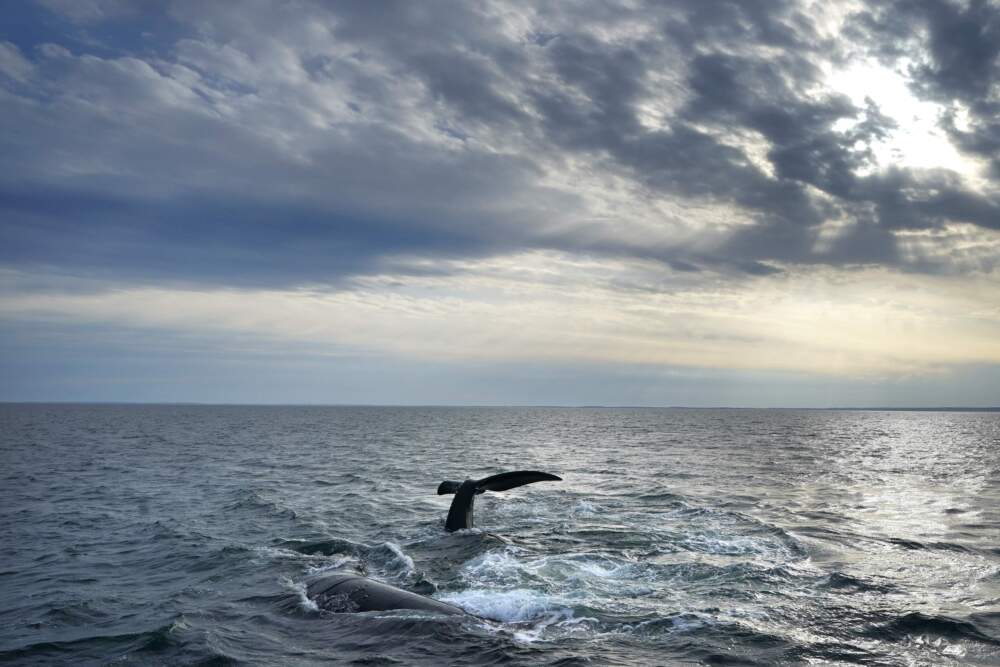Advertisement
Commentary
Who’s behind the latest effort to 'save the whales'? The fossil fuel industry

The website for Save the Right Whales Coalition conveys the image of a grassroots organization dedicated to protecting a majestic mammal teetering on the brink of extinction. But the general public is likely unaware that the people behind the website are exploiting the right whale’s precarious situation to further a completely different agenda.
“They survived whaling, but won’t survive wind energy,” reads the site’s headline, a tipoff that the organization’s true objective is to impede the progress of offshore wind power.
The Save the Right Whales Coalition is just one of a panoply of anti-renewable organizations identified in a new report from the Brown University Climate Development Lab that outlines a coordinated effort to combat the threat of offshore wind to the fossil fuel industry.
The coalition was created in 2021 as an offshoot of Environmental Progress, an entity with a progressive name and regressive ideas founded by climate contrarian Michael Shellenberger. Shellenberger is a vocal advocate for natural gas and a frequent critic of renewable energy. Donations to Save the Right Whales are funneled directly to his parent organization.
That connection is just one link in a convoluted network that the Brown report illuminates. Here in Massachusetts, for example, a Nantucket-based group now calling itself “ACK for Whales” is one of Save the Right Whales Coalition’s earliest member organizations. This group initially operated under the less deceptive name "Nantucket Residents Against Turbines."
The Brown report is significant for identifying a diverse array of anti-wind organizations — many of which are “supported by well-funded, national organizations with ties to the fossil fuel industry and dark money” — and illuminating the interconnected structure that defines their network. It unveils an orchestrated effort to conjure public opposition to offshore wind, leveraging what are ostensibly local grassroots organizations.
Save the Right Whales and two other coalitions dominate the tangled web that the report lays out. At the center of it all is the American Coalition for Ocean Protection (ACOP). This organization was founded by The Caesar Rodney Institute, a Delaware-based libertarian think tank with a long history of opposing renewable energy. The Caesar Rodney Institute publicly supported a federal lawsuit brought by the Nantucket group in 2021. While the institute takes every opportunity to disparage offshore wind energy, it has promoted offshore drilling for oil.
[The Brown report] unveils an orchestrated effort to conjure public opposition to offshore wind, leveraging what are ostensibly local grassroots organizations.
As the Brown report makes clear, ACOP’s member organizations, like those of Save the Right Whales, include what appear to be grassroots groups that have popped up in locales from North Carolina to Maine. The coalition also counts among its members several think tanks with a history of climate change skepticism and a pronounced ideological bias against renewable energy.
These same groups that dismiss climate threats are also part of the third key coalition, State Policy Network, which has well-documented ties to the Texas Public Policy Foundation and the Charles Koch Foundation, arms of the fossil fuel industry’s propaganda apparatus. According to the researchers at Brown, over $72 million was pumped through these dark money channels between 2017 and 2021.
Legitimate criticism of environmental harm stands on its own, ulterior motives aside. The question that must be asked is whether the scientific claims put forth by these groups about dangers to whales are valid, even if they are being promulgated for the primary purpose of discrediting offshore wind and renewable energy.
The answer is a qualified “no.” Scientists who examined the possible effects of wind energy development on whales failed to identify a causal relationship between construction activity and an abnormally high number of whale deaths recorded since 2016. A study by the New Jersey Department of Environmental Protection in August 2023 found that it “has no reason to conclude that whale mortality is attributable to offshore wind-related activities.”
An analysis reported by the Associated Press in December 2023 supports that finding, citing a marine biologist from Cornell who saw no cause to blame whale deaths on offshore wind activity. The article also notes that studies in Europe, where offshore wind farms have existed for decades, similarly have uncovered no evidence that turbines kill whales.

Save the Right Whales posted a pointed rebuttal to the AP article on its website, calling it “misleading” and “disinformation.”
It is telling, however, that the front groups never bring up the two leading causes of whale deaths according to the National Oceanic and Atmospheric Administration, namely entanglement in fishing gear and collisions with ships. A study out of the National Marine Mammal Lab found that speed reductions can drastically reduce lethal vessel strikes. If whale activists are genuinely concerned about cetacean welfare, their narrow focus on wind energy is difficult to explain.
This is not to suggest that offshore wind is entirely free of environmental risk. It has long been recognized that increased human activity in ocean waters poses potential nonlethal harm to marine mammals. For that reason, established environmental groups including the National Wildlife Federation, the Natural Resources Defense Council and the Conservation Law Foundation in 2022 successfully negotiated for speed restrictions, noise reduction and enhanced monitoring.
There are undoubtedly sincere individuals in these local front groups with unalloyed passion for preserving marine species. However, the contention that the mitigation measures already in place are inadequate to prevent serious injuries to whales hasn’t held up to scientific scrutiny. The case for abandoning the technology essential to the critical goal of decarbonizing the region’s electric grid just isn’t there.
The comprehensive report from Brown University clearly shows propagandists are agitating at the local level to sustain a false narrative advancing their anti-renewable agenda. They are framing speculation as evidence, correlation as cause, and opinion as science.
In their zeal to defeat offshore wind energy, these conservative organizations are disingenuously employing the emotional trope of “protect the whales.” But what they really aim to protect is the fossil fuel status quo.
